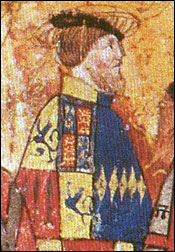The Pilgrimage of Grace
Chapter 8 : Bigod's Rebellion
Having persuaded the rebels to stand down, Henry, aided by Cromwell, now embarked on a policy of "divide and rule". He had been lucky in that none of the northern magnates had joined the rebels – Shrewsbury, Derby and Cumberland had all resisted and, in the former cases, led Government troops.

The greatest magnate of all, Henry Percy, 6 th Earl of Northumberland, had been conspicuous by his absence from either side, although his hated younger brother, Sir Thomas Percy, was a leading light in the rebellion, and many of the gentry leaders were tenants of Percy. King Henry now sought to divide the gentry from the commons. Persuaded of the King's sincerity, Aske was extolling the success of the year's events, but the commons, more sceptical, were beginning to doubt, as no delivery on promises was forthcoming.
John Hallam, one of the Captains of the 1536 rising, confided his fears to Sir Francis Bigod. Interestingly, Bigod was an Evangelical, but he was horrified by the idea, that having thrown over the Pope (which Bigod heartily endorsed) Henry was now claiming to have the "cure of souls" himself. A plan was hatched to capture Hull and Scarborough, and then to take the Duke of Norfolk (whom they assumed would be sent north) captive and force him to act as a mediator with the Government.
The whole campaign was a disaster. The gentry who had, they thought, escaped lightly from the events of the previous year, would have nothing to do with the scheme. The commons rose sporadically across the North-West and eventually converged on Carlisle, where they were roundly defeated on 16 th February 1537.


